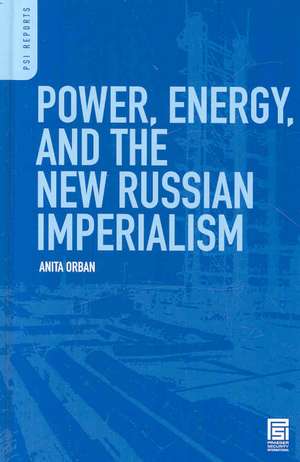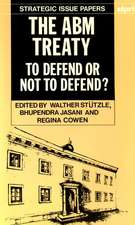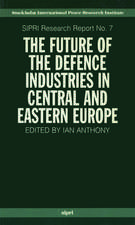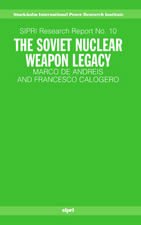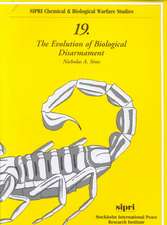Power, Energy, and the New Russian Imperialism: PSI Reports
Autor Anita Orbanen Limba Engleză Hardback – 29 sep 2008 – vârsta până la 17 ani
Din seria PSI Reports
- 35%
 Preț: 414.13 lei
Preț: 414.13 lei - 28%
 Preț: 412.88 lei
Preț: 412.88 lei - 28%
 Preț: 361.86 lei
Preț: 361.86 lei - 27%
 Preț: 376.91 lei
Preț: 376.91 lei - 28%
 Preț: 437.31 lei
Preț: 437.31 lei - 24%
 Preț: 412.88 lei
Preț: 412.88 lei - 28%
 Preț: 412.61 lei
Preț: 412.61 lei - 27%
 Preț: 376.58 lei
Preț: 376.58 lei - 27%
 Preț: 376.43 lei
Preț: 376.43 lei - 28%
 Preț: 438.17 lei
Preț: 438.17 lei - 27%
 Preț: 378.09 lei
Preț: 378.09 lei - 28%
 Preț: 437.75 lei
Preț: 437.75 lei - 24%
 Preț: 459.91 lei
Preț: 459.91 lei - 28%
 Preț: 459.91 lei
Preț: 459.91 lei - 28%
 Preț: 412.79 lei
Preț: 412.79 lei - 24%
 Preț: 459.51 lei
Preț: 459.51 lei - 28%
 Preț: 435.55 lei
Preț: 435.55 lei - 28%
 Preț: 375.66 lei
Preț: 375.66 lei - 24%
 Preț: 462.45 lei
Preț: 462.45 lei - 27%
 Preț: 360.03 lei
Preț: 360.03 lei - 14%
 Preț: 333.24 lei
Preț: 333.24 lei - 28%
 Preț: 437.40 lei
Preț: 437.40 lei - 27%
 Preț: 370.30 lei
Preț: 370.30 lei - 24%
 Preț: 463.72 lei
Preț: 463.72 lei - 27%
 Preț: 379.88 lei
Preț: 379.88 lei - 18%
 Preț: 322.02 lei
Preț: 322.02 lei - 18%
 Preț: 335.62 lei
Preț: 335.62 lei - 14%
 Preț: 337.61 lei
Preț: 337.61 lei - 27%
 Preț: 339.36 lei
Preț: 339.36 lei - 26%
 Preț: 348.26 lei
Preț: 348.26 lei
Preț: 462.45 lei
Preț vechi: 609.32 lei
-24% Nou
Puncte Express: 694
Preț estimativ în valută:
88.50€ • 96.10$ • 74.34£
88.50€ • 96.10$ • 74.34£
Carte tipărită la comandă
Livrare economică 23 aprilie-07 mai
Preluare comenzi: 021 569.72.76
Specificații
ISBN-13: 9780313352225
ISBN-10: 0313352224
Pagini: 264
Ilustrații: 31 (b&w) illustrations
Dimensiuni: 156 x 235 x 25 mm
Greutate: 0.54 kg
Editura: Bloomsbury Publishing
Colecția Praeger
Seria PSI Reports
Locul publicării:New York, United States
ISBN-10: 0313352224
Pagini: 264
Ilustrații: 31 (b&w) illustrations
Dimensiuni: 156 x 235 x 25 mm
Greutate: 0.54 kg
Editura: Bloomsbury Publishing
Colecția Praeger
Seria PSI Reports
Locul publicării:New York, United States
Notă biografică
Anita Orban is the Executive Vice President of the International Center for Democratic Transition in Budapest. She is a foreign affairs columnist for Heti Valasz, one of Hungary's leading political weeklies, and served as the editor of its foreign affairs section. She has advanced degrees in international relations from the Fletcher School of Law and Diplomacy, Tufts University, and has taught at various universities in Budapest. Fluent in English, Russian, German, and Hungarian, Orban is a frequent speaker on foreign policy issues and contributor to journals published in Hungary, Poland, Estonia, and the UK.
Cuprins
AcknowledgementNames of Most Frequently Mentioned CompaniesCHAPTER I: INTRODUCTION A conflict of interests: the Russian angleCHAPTER II: THEORETICAL BACKGROUNDCHAPTER III: INTRODUCING THE INDEPENDENT VARIABLESIII.1. Russian Perceptions About Relative Power DistributionIII.2. State PowerIII.3. Predictions Based on the HypothesesCHAPTER IV: PLANTING THE SEEDS - RUSSIAN ENERGY COMPANIESIV.1.1. Perceptions and State PowerIV.1.2. Russian Foreign Policy towards Central EuropeIV.2. Facing NATO Enlargement: 1993-1996IV.2.1. Perceptions and State PowerIV.2.2. Russian Foreign Policy towards Central EuropeIV.2.3. Conduct of Russian Energy Companies in Central EuropeIV.3. Against a Unipolar World: 1996-1998IV.3.1. Perceptions and State PowerIV.3.2. Russian Foreign Policy towards Central EuropeIV.3.3. Russian Energy Companies in the RegionIV.4. Instability and Uncertainty: 1998-2000IV.4.1. Perceptions and State PowerIV.4.2. Russian Foreign Policy toward Central EuropeIV.4.3. Russian Energy Companies Conduct in the RegionCHAPTER V: CONSOLIDATING STATE POWER - RUSSIAN ENERGY COMPANIES EXPANSION INTO CENTRAL EUROPE DURING THE FIRST PUTIN PRESIDENCY, 2000-2004V.1. Perceptions and State PowerV.2. Russian Foreign Policy toward Central EuropeDiplomatic RelationsV.3. Russian Energy Companies Conduct in the RegionCHAPTER VI: HARVEST AND OBSTACLES - RUSSIAN ENERGY COMPANIES EXPANSION INTO CENTRAL EUROPE DURING THE SECOND PUTIN PRESIDENCY (2004-2008)VI.1. Perceptions and State PowerVI.2. Russian Foreign Policy toward Central EuropeVI.3. Russian Energy Companies Conduct in the RegionCHAPTER VII: CONCLUSIONBIBLIOGRAPHY
